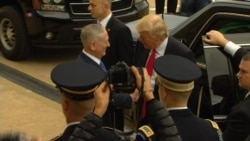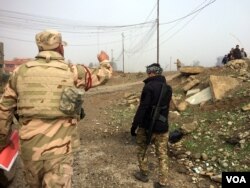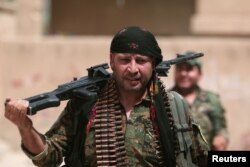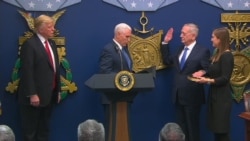President Donald Trump made his first trip to the Pentagon as commander in chief Friday, signing two executive actions during his visit.
During a ceremonial swearing-in ceremony for Secretary of Defense James "Jim" Mattis, Trump described his executive memorandum as a "great rebuilding" of the armed services, to include new planes and ships and other "tools" for the military.
In the second action, Trump signed an executive order, following through on his campaign promise of "extreme vetting" of those who wish to immigrate to the United States. He said the new vetting measures would be designed to "keep radical Islamic terrorists out" of the country.
WATCH: Trump Arrives at the Pentagon
"We only want to admit those into our country who will support our country and love deeply our people," Trump said, adding the U.S. would never forget the lessons of the Sept. 11, 2001, terrorist attacks on the United States, which included an attack on the Pentagon, where 184 people lost their lives.
Critics of the executive order include No One Left Behind, an organization that resettles wartime translators inside the United States. The group issued a statement Friday saying the executive order would "shut the door" on foreign interpreters who have served alongside the military and are now looking for refuge in the United States.
Defeating IS
During the Pentagon visit, Trump, Vice President Mike Pence and National Security Adviser Michael Flynn met with top military leaders, including the defense secretary and members of the Joint Chiefs of Staff.
A defense official said the president asked leaders at the meeting Friday for new options on how to defeat Islamic State, along with options on how to build readiness and recapitalize the military.
A U.S. official had told VOA ahead of the meeting that the president would be looking for counter-Islamic State (IS) options considered "off the table" during the previous administration.
In turn, top defense officials were expected to look for clear priorities to direct the counter-IS fight.
For example, one defense official told VOA on Friday that the Obama administration had made dual priorities of keeping ally Turkey satisfied and defeating IS.
"When everything is a priority, nothing is a priority," the official told VOA. "Just tell us what is THE priority."
One counter-IS option that could be drafted for Trump is arming or otherwise enhancing the capabilities of a Syrian Kurdish group known as the YPG.
American support for the group is a sensitive proposal because NATO-ally Turkey considers the group a terrorist organization. However, Kurdish forces makes up the bulk of the force to retake Raqqa and have proven very effective against IS in Syria’s north and east.
Other options to enhance the counter-IS fight could include providing U.S. Apache helicopter support in the battle for Raqqa, or sending more U.S. troops to the region.
Room to maneuver
The military is likely to ask Trump for broader authorities to give commanders room to maneuver in the fight. A defense official said this change could allow delegation at a lower level in order to "alleviate the micro-approving that's been going on" and provide "speed and agility to tailor solutions to battlefield problems."
When pressed by VOA, the official said an example of "micro-approving" was when the military was authorized to have a forward mobility number of exactly 203 troops in Syria last year.
"Every single person had to be approved," the official said.
If the new administration makes authorizations more flexible for the commanders, "that would be a different equation for a warfighter, and probably easier," he added.
The absence of General Joseph Votel, the commander of U.S. Central Command, which oversees the counter-IS operation in Iraq and Syria, supported officials' expectations that this meeting would be more of a springboard for future strategic options to be presented at a later date.
WATCH: Swearing-in Ceremony for Defense Secretary Mattis
WATCH: Mattis Thanks Trump for Having 'Confidence in Me'
Speaking to reporters earlier Friday, Trump also addressed concerns about the use of torture and other enhanced interrogation methods under his administration. He said that while he disagrees with Defense Secretary Mattis' thoughts on enhanced interrogation of American enemies, the defense secretary's opinion would "override" his own.
"He's an expert. He's highly respected," Trump said, "and so I'm going to rely on him."
Mattis has stated publicly that he does not believe in the use of torture, an interrogation method that Trump said he feels "does work."



















